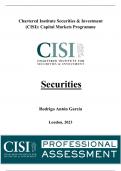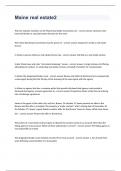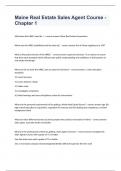Samenvatting
Summary Securities (CISI Level 3) - Capital Markets Programme / IOC
- Vak
- Instelling
Summary of CISI Level 3 Securities exam (Post-April 2023) Detailed notes from a multitude of materials. Follows official syllabus order. Includes answers to c.90& of possible MC questions. Topics covered include: 1) The Financial Services Industry, 2) Asset Classes, 3) Markets, 4) Primary Ma...
[Meer zien]






